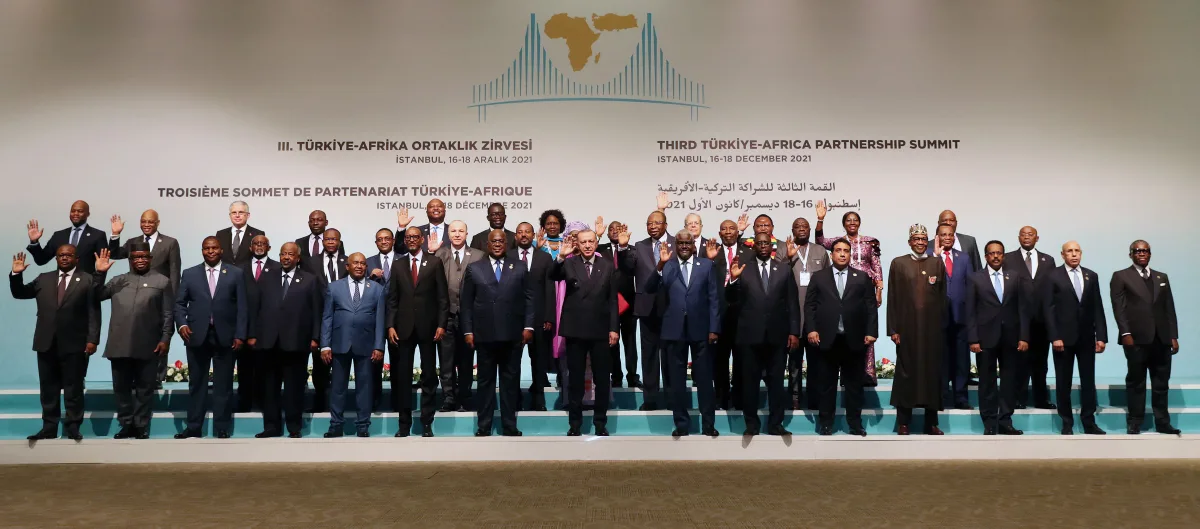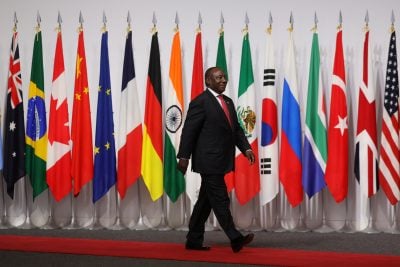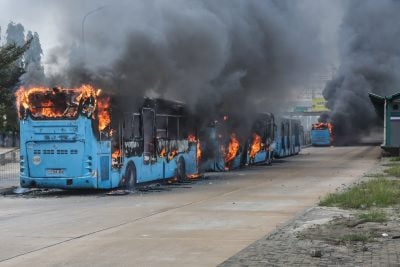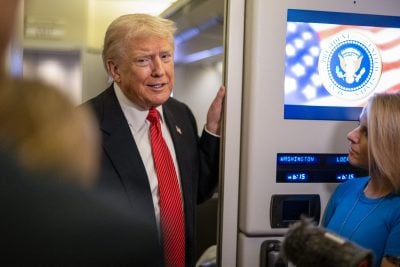At a meeting in Luxembourg in December 1997, the European Council decided to open accession negotiations with all the countries that had applied for membership, apart from one: Turkey.
The rejection was justified by European leaders on the grounds that Turkey did not satisfy the democratic requirements for European Union membership and that its adherence to the rule of law was not strong enough.
Turks suspected, however, that the real reason was not political, but cultural – that white Europeans simply did not see a place in the EU project for a Muslim-majority, part-Asian country on its eastern flank. The experience prompted a period of soul-searching among Turkey’s political, economic, and foreign policy elite as Ankara sought to work out the country’s place in the world.
The result was an emphasis on the so-called “Global South,” and particularly Africa, as a potential route to greater geopolitical power and economic prosperity.
Teresa Pinto, assistant professor at Lusofona University in Lisbon and an expert in African affairs, explains that “realising that it would be difficult to join the European project, Turkey launched its ‘Action Plan for Africa’ in 1998 and, in 2005, started implementing the ‘Opening to Africa’ programme.”
Pinto tells African Business that “the strategy was comprehensive, including both economic and cultural diplomacy initiatives, with a heavy focus on education, and involving both civil society and business actors. And it paid off. Trade between Turkey and Africa has increased eightfold in just two decades. African countries have become strategic destinations for the expansion and consolidation of the Turkish airline industry, and as markets for the Turkish defence industry.”.
The growth in economic ties between Ankara and Africa is indeed impressive. Bilateral trade between Turkey and the continent surpassed $40bn in 2022, up from just over $5bn in 2003. Turkish contractors are currently working on construction projects worth some $85bn. Turkish Airlines serves more than 60 destinations in Africa. Turkey’s defence industry alone exported more than $288m worth of goods in 2021.
New opportunities, new markets
Turkey has traditionally focused its African investments in North Africa – a legacy of the Ottoman Empire which once stretched across the region – but is increasingly expanding its presence across Sub-Saharan Africa to take advantage of new opportunities in rare earth materials and other critical natural resources, as well as renewable energy.
Just last month, Istanbul-based energy firm Karpowership, which runs a fleet of power-generating ships, announced plans to increase its presence in 15 African countries including Kenya, Nigeria, Cameroon, Gabon, and Angola as part of its target of doubling its electricity production capacities.
What is behind this long-standing relationship that is showing no signs of slowing down – and indeed seems to be accelerating?
Federico Donelli, Professor of International Relations at the University of Trieste, tells African Business that Turkey’s economic and political success on the continent is partly because of “its unique and hybrid image in Africa”.
“In recent years, Turkey has aimed to set itself apart from traditional and emerging players. It is a Muslim country with less-than-democratic institutions, industrial development, EU candidacy, NATO membership, and less colonial history in Africa,” Donelli says.
“The Turkish proposition presents a middle or third way, differing from both Western liberal and Chinese authoritarian capitalism.”
“This approach signifies a path of growth and development that resonates with the aspirations of many African countries. Turkey seeks to share with African countries its own development paradigm or formula that has proved successful in its own rapid economic growth. Rather than creating new relations of dependence, Turkey’s approach tends to focus on political equality, mutual economic development, and a long-term social partnership,” he adds.
In the economic sphere, this approach also means that Turkish investments and financial donations in Africa tend not to come with governance-related conditions.
“Turkey speaks the language of state sovereignty, and that is definitely an advantage,” Lusafona University’s Pinto tells African Business.
“Like China and Russia, it does not impose political conditions on African countries. These conditions are perceived by many as a violation of their sovereignty and a new, if more benevolent, form of imperialism or colonialism.”
“Turkey is more prepared to establish deals and allegiances in a world where realpolitik is definitely back,” she adds.
Shared global governance goals
Indeed, another factor behind the burgeoning of Turkey-Africa trade and economic relations is their shared goal to reform global governance structures. Many African leaders have been vocal about the need to rework Bretton Woods institutions such as the International Monetary Fund (IMF) and the World Bank, which are seen by many in the Global South as unfairly concentrating economic and political authority in Western capitals. The African Union’s recent admission into the G20 is perhaps a small step towards a rebalancing of power, but there is a broad desire across the continent for much wider reform.
This is something that Turkey’s President Erdogan has been able to tap into when building diplomatic and economic relationships across Africa – not least because Ankara shares a similar feeling of having been spurned by the EU and other Western-dominated institutions. Erdogan has been vocal in his view that the United Nations Security Council is in particular need of reform, frequently arguing on foreign trips to Africa and elsewhere that “the world is bigger than five.”
Donelli notes that “Turkey is very proactive in promoting greater inclusion in governance decision-making. There is a regular appeal to the claims of African countries and the Global South.”
“This makes for a win-win relationship. Turkey needs to increase its popularity among African states to improve its international status and gain support for its demands in international bodies,” he says.
“African countries and institutions, such as the African Union, also benefit by gaining support for greater involvement in global decision-making and access to major international fora such as the G20.”
A notable presence
As Turkey’s economic and political interest in the continent grows, many African countries are seeing an increasingly large Turkish presence. For example, the number of Turkish embassies in Africa has grown from just 12 in 2002 to 44 by 2022, with Erdogan saying he wants to see this number rise to 50. One driver of these closer ties, Pinto argues, is simple proximity – Turkey is nearer to Africa than most other medium or large powers, “which is critical in the geopolitical and geoeconomic domains”.
Given this proximity and how central Africa now is to Turkey’s strategic goals, Ankara is becoming more directly involved in events on the continent. Mehmet Ozkan, professor at the Turkish National Defence University in Istanbul, predicts that “relations between Turkey and Africa will improve and expand further in the coming years” and notes that “we have seen recently that Turkey is increasingly cooperating militarily with African countries and is now involved in regional conflicts such as in Somalia, Sudan, and Ethiopia.”
Ozkan says that “defence ties are very important for Turkey and will become even more important in the near future… Africa is one of the biggest markets for military equipment and is therefore a key route for Ankara-made products to enter the international arena.”
Donelli also notes that “Turkey is presenting itself as a partner for African states, both through the export of military equipment and the training of security forces. The most famous case is the sale of drones, but this is only the tip of the iceberg.”
“This trend also reflects the changes within Turkish decision-making, where the ties between defence factories and the political elite have become tighter,” he says, in a reflection of how intertwined Turkish economic, political, and military considerations in Africa have become.
Donelli brands Turkey’s distinctive approach to Africa as the “Ankara Consensus” – a consensus that both sides hope will yield significant political and economic results in the years ahead.
“The Ankara Consensus can be seen as a new model for the economic, political, and social development of African countries,” he says. “It is an alternative to both the so-called Washington Consensus, dominated by the United States and Europe, which advocates neoliberal economic and development policies, and the more recent Beijing Consensus, which emphasises state-led economic growth and prioritises stability over democracy.”
As Turkey continues to expand this model across the continent – and dedicates more resources beyond its traditional focus of North Africa – African leaders will be hoping the “Ankara Consensus” can help deliver greater prosperity and political representation at the global level.
Want to continue reading? Subscribe today.
You've read all your free articles for this month! Subscribe now to enjoy full access to our content.
Digital Monthly
£8.00 / month
Receive full unlimited access to our articles, opinions, podcasts and more.
Digital Yearly
£70.00 / year
Our best value offer - save £26 and gain access to all of our digital content for an entire year!
 Sign in with Google
Sign in with Google 



